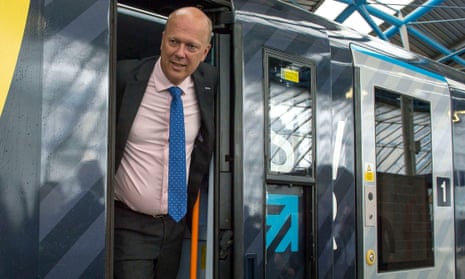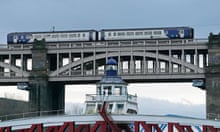Chris Grayling has declined to take personal responsibility for this summer’s rail chaos after a regulator’s report concluded that nobody had taken charge of the crisis, saying “a system problem” had been the primary cause.
The transport secretary conceded that in retrospect he could have been more sceptical about assurances from rail operators that timetable changes could be properly managed, but said it was “tough for any politician to overrule the advice of the professionals”.
The report into the timetabling fiasco that left thousands of passengers stranded earlier this year concluded that nobody took charge even when it became clear the project was in serious trouble.
In an interim report the Office of Road and Rail (ORR) singled out the train operators Govia Thameslink Railway (GTR) and Northern, Network Rail and the Department for Transport (DfT) for criticism, saying their mistakes had led to the collapse of services.
Speaking about the report on BBC Radio 4’s Today programme, Grayling said he had been told the project, the biggest ever changes to UK timetables, would not cause major problems: “We clearly took at face value the assurances of the industry that it was ready to do this. We were wrong to accept that at face value.”
Grayling accepted this had been a mistake, but argued he could not be held personally responsible for the chaos that ensued.
“In hindsight, yes, but when you have the leaders of the industry sitting in your office saying: ‘We are ready for this’, it’s tough for any politician to overrule the advice of the professionals,” he said.
“Clearly, I’m extremely unhappy that they told me they were ready and they weren’t. That underlines to me the need to shake up the way this industry works.”
Asked whether he should consider his position, Grayling argued he had responded rapidly when the problems began: “My job, in my view, is to get this sorted.”
The transport secretary also declined to place blame on rail operator bosses: “I think each of the organisations involved need to look at how they, themselves, are organised. I’m not going to point the finger at individuals today. It’s a system problem. It’s the way the whole industry works. That’s what the review says.”

Introducing the report, the ORR chair, Stephen Glaister, said: “Good intentions and over-optimism within the rail industry about its ability to recover missed deadlines left no time to uncover and fix problems.
“In the event the operators were overwhelmed. They had made insufficient provision to help people in the event that things went wrong.”
The ORR’s interim report was published as the DfT launched a “root and branch” review of the UK rail network. The former British Airways chief executive Keith Williams will lead an examination of Britain’s rail network, which has Grayling admitted is “no longer fit to meet today’s challenges”.
Grayling told Today the reorganisation could result in integrated regional rail companies, as in Japan, or a system like Transport for London, with close integration and performance-related contracts.
But he ruled out the idea of renationalisation: “The reality is, it’s not about ownership, it’s about the pressure on the system, it’s about ways of working. In a sense, that would be like saying, let’s go back to the days of British Rail, and I don’t remember British Rail being a great paragon of success, either.”
The review follows a litany of rail crises including the renationalisation of the east coast line for the second time in 10 years, delays caused by strikes and engineering works, and a summer of misery for passengers as new timetables that took effect on 20 May caused mass cancellations across the north of England and on commuter lines into London.
Glaister said Network Rail’s timetable planning department did notice a problem was developing with the May changes. “But they did not take sufficient action to manage the risks or the consequences,” he added. “The present industry arrangements do not support clarity of decision making: it was unclear who was responsible for what. Nobody took charge.”
The ORR blamed GTR and Northern for being badly prepared for the timetable changes and not doing enough to keep passengers informed of disruption.
The rail regulator also criticised the DfT and itself for failing to question the industry’s assurances about the risk of disruption.
The ORR concluded that the rail industry had “placed engineering and planning concerns ahead of serving its passengers, and that was made worse by the poor information train operators provided when disruption happened”.









